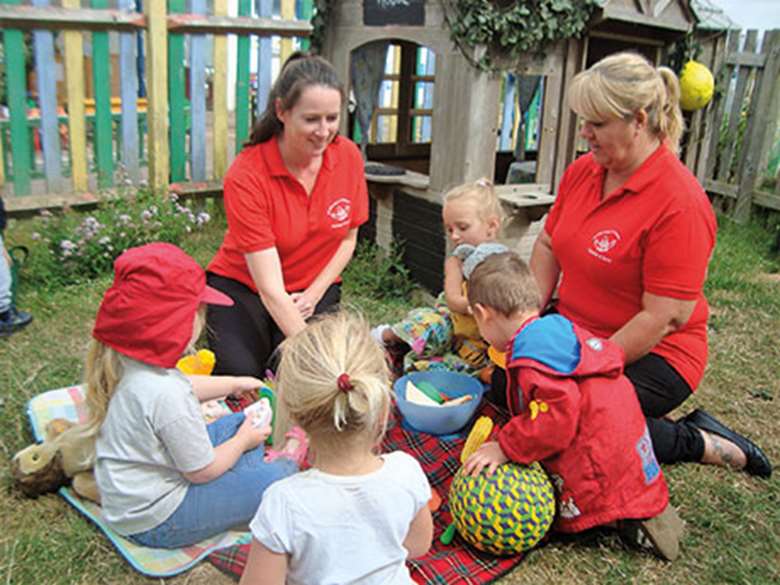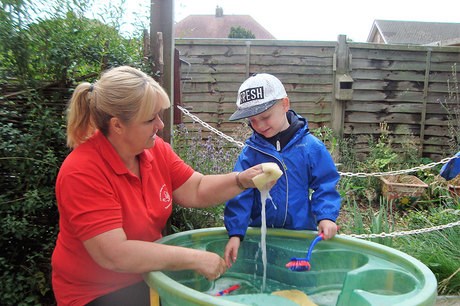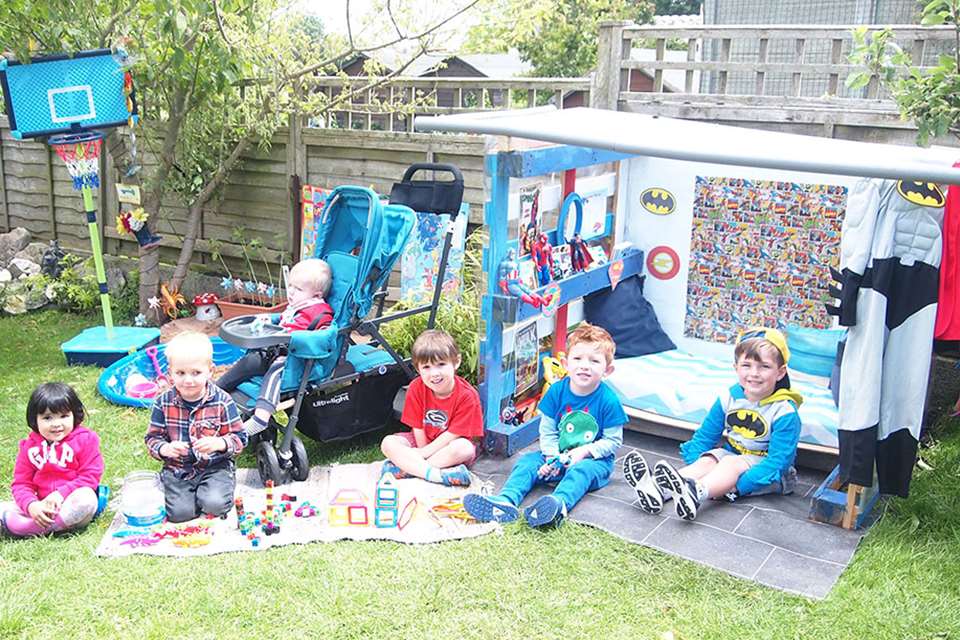Kent settings lobby MPs on cut to SEND funding
Monday, July 23, 2018
Early years settings in Kent have raised concerns about cuts to the level of funding for children with special educational needs and disabilities.

- Kent settings have written to Government and council on cuts to SEND funding
- Issue revolves around debate on the need for one-to-one support
Early years settings in Kent have raised concerns about cuts to the level of funding for children with special educational needs and disabilities.
In a letter sent to education ministers, local MPs and the council, they say they are experiencing ‘insurmountable difficulties in meeting the needs of very young, vulnerable children who have special needs’.
The letter says that the lack of funding for children with SEND is putting them in an ‘unacceptable position’. They claim it will lead to them either being unable to safeguard children, excluding children with SEND, or funding support themselves, ultimately resulting in the closure of settings.
The letter has been signed by ten private and voluntary nurseries and pre-schools in the Canterbury area.
One issue revolves around the ability of nurseries to claim for one-to-one funding for children with SEND.
The letter says, ‘We are not allowed to claim one-to-one funding for these children, as we are told that one-to-one support is not necessary for children. We would like to invite those who believe this to be the case to come into our settings and show us how we can safeguard, let alone teach, children who have no speech, no understanding of danger or risk and an active curiosity to explore, climb, throw, hit and taste, within usual ratios.’
Isabel Harvey, project manager and teacher at Hersden Under 5s, told Nursery World, ‘There was a sudden change in the funding for high-level complex needs. There was limited information.
‘We now need to provide two terms of evidence from when the child turns three. You used to be able to bypass that in certain situations, but they’ve clamped down on that. They’re constantly changing the process of applying for funding.’
Previously, early years settings were able to claim £7.90 per hour for children with the most complex needs, but the highest rate per child, now called the Special Educational Needs Inclusion Fund (SENIF), is now £4.50 an hour, described as a ‘contribution’, Ms Harvey said.
There is also debate about the need for one-to-one funding for children with complex needs.
Ms Harvey said, ‘Some children do require one-to-one funding for their safety. We had one child who started when he was two and received no free education funding because he had no formal diagnosis at two. We want to do the best for these children, but we need to staff it, give children the support they need. It does cost money.’

Hersden Under 5s has 30 children on register and around one in five of them has SEND.
Ms Harvey said, ‘They all need some extra support, whether it’s for speech and language, or high complex needs where they need one-to-one support.’
One child has autism and also attends a specialist nursery two days week. A second child with autism will attend a specialist nursery in September, which has taken nearly a year to secure.
While some children would be eligible for funding through an Education, Health and Care Plan (EHCP), nursery children do not often have one in place.
Ms Harvey said, ‘We get that process rolling but it takes time and it may be when they go to school.’
She added that funding problems were an ‘unfortunate result of the 30 hours’ because the changes were brought in last September, when the extra entitlement came into force.
She added, ‘The teams we liaise with at Kent County Council are doing what they can to support us.’
Council response
SENIF (formerly SCARF) is Kent County Council (KCC)’s name for the top-up support for settings caring for children with SEND, becoming statutory in April 2017.
A council bulletin in July last year said, ‘With the implementation of the extended entitlement (30 hours), there will be a considerable impact on the budget allocated for SENIF, which will not be increased.’
Ms Harvey said, ‘The reason we have written the letter now is because it has taken considerable time for individual cases to be processed, then it has been a culmination of the settings within the collaboration comparing how little children are entitled to, and how inflexible the system is. We still have no information about how much children are entitled to, only what is awarded as a “contribution” in each individual case.
‘KCC seem unable to address the issue, which is why we decided to send the letter to those who may be in a position to make changes happen.’
Louise Langley, interim head of SEN assessment and placement at the council, said, ‘Kent County Council appreciates the hard work of our pre-school settings to meet the needs of children with SEN and understands the difficulties in managing the required provisions and staffing to deliver within the budget available.
‘We endeavour to support our pre-school settings by providing access to top-up funding, which is based on need and in line with the eligibility criteria for Free Early Years Entitlement… Kent recognised the importance of early intervention in supporting these children and has therefore continued to include them in the SEN Inclusion Fund (SENIF).
‘Settings are not normally encouraged to work on a one-to-one basis with children for the whole of their time in a setting (unless there are significant medical needs) as research has shown that this is not the best way of developing independence, resilience and interactions. Settings are encouraged to work with children in small groups and only have parts of the session around targeted interventions.
‘We take any concerns raised by our settings seriously and hope we can work with the Canterbury Early Years United Collaboration to resolve specific issues raised.’
CASE STUDY
Jane Hicks, owner, New House Nursery, Canterbury

‘We had a little boy who joined in September last year, who had deferred Reception class, with developmental delays. His parents, the school, and the local authority had decided that a year extra in nursery would be good.
‘The funding we were offered was so minimal – I couldn’t buy extra resources or fund extra staff. In the past you would put in invoices for extra wages or resources and would be offered a package for that child.
‘There’s an awful lot of paperwork. There are two tiers of funding. You can’t apply for SENIF without two terms of evidence from a specialist teacher. We only had a year to work with this child and for me to gather two terms with a specialist teacher would have only got funding for one term.
‘I was told I could apply for emergency funding. I had to re-submit and it didn’t come through until April. I ended up paying upfront and reclaiming the funding.
‘I couldn’t do that for every child. I would seriously consider the demands and impact on children and staff. You’re working under tremendous stress if you haven’t got that support. Our universal inclusion is good, it’s not just about one to one; it’s about enhancing ratios. For speech and language therapy, occupational therapists and physios, you need the key person and the SENCO to be in the meetings. You still need to cater for the other children.
‘It’s about enhancing ratios to give children individual, intensive support; for example, speech and language therapy for half an hour, writing up, assessing the programme to provide evidence. A lot of speech and language referrals can take ten months to a year in order to get the therapy.
‘I think some children do need one to one – if you have a child with complex needs, including health needs. Our ratios are 1:5 or 1:6. If we did 1:8 it would be impossible. It’s all very well being inclusive, but someone could hand in their notice because of the stress of it.
‘Without enhanced ratios, we would be letting the children down and all other children.’
Expert view
Is one-to-one support always the best practice for children with SEND?
 by Julie Revels, Early years consultant specialising in SEND and inclusion
by Julie Revels, Early years consultant specialising in SEND and inclusion
One-to-one support is a contentious and sensitive issue. It has been thought it is a route to support inclusive practice and improve children’s outcomes.
There is a myth that one-to-one support always provides the best outcomes for children with special educational needs and disabilities.
All children can benefit from high-quality early years provision and support for their development and learning from skilled, knowledgeable and confident practitioners working closely with the child’s parents. Supporting children with SEND is a whole-setting responsibility and requires carefully planned opportunities and experiences which promote the child’s skills as an independent learner, balanced with targeted specific support for aspects of the child’s development where additional support is required.
A whole-setting approach that incorporates quality universal practice with targeted and specific support and where specialist guidance is sought and implemented as needed challenges the assumption that an extra adult leads to more progress and better outcomes.
The debate about the impact of one-to-one support on children’s outcomes has come at a time when funding is becoming tighter and services and support are being cut. If these cuts feel like the rug is being pulled from under our feet, it is less likely that we can engage in the process of improving and shaping good inclusive practice.
We need to work together with practitioners, parents and professionals from health, social care and beyond to develop an improved understanding of what really makes a difference to children’s outcomes.
- Read Canterbury Early Years United Collaboration’s letter here











